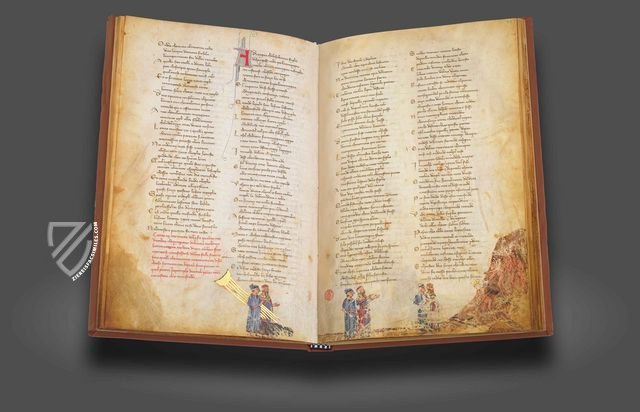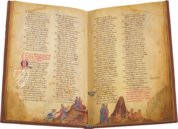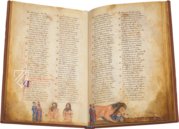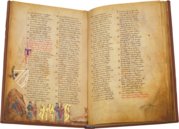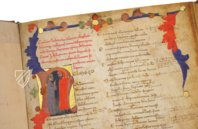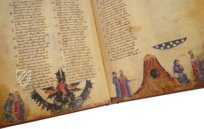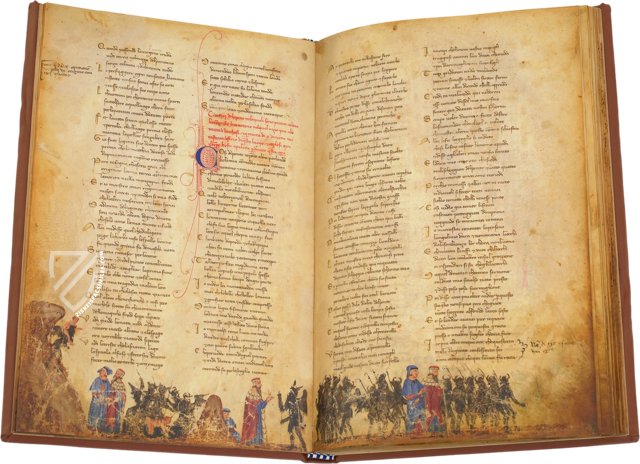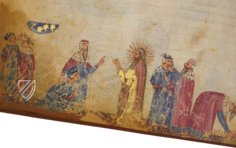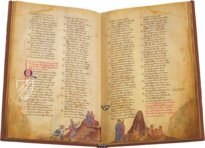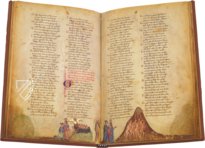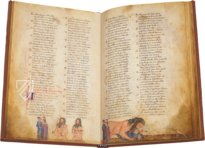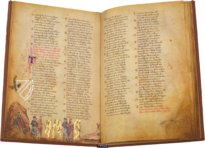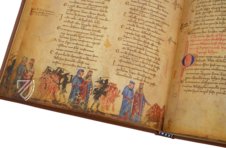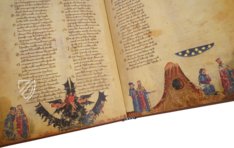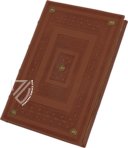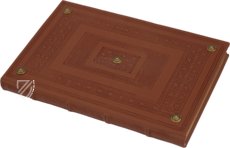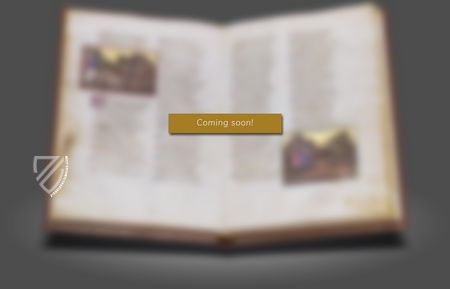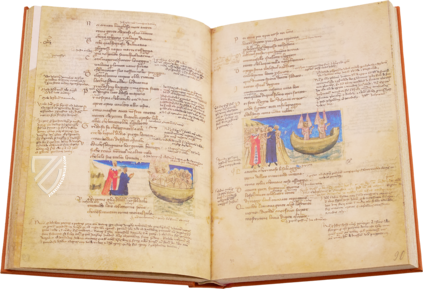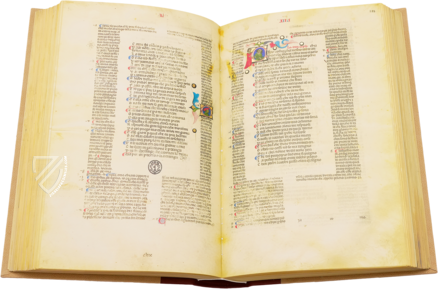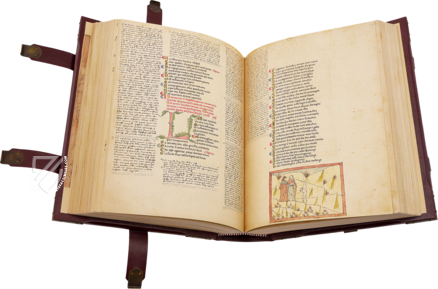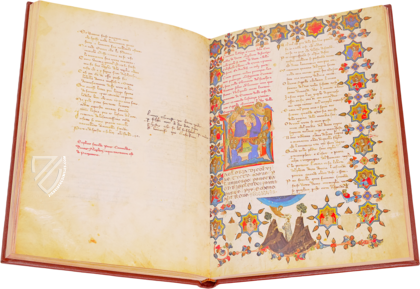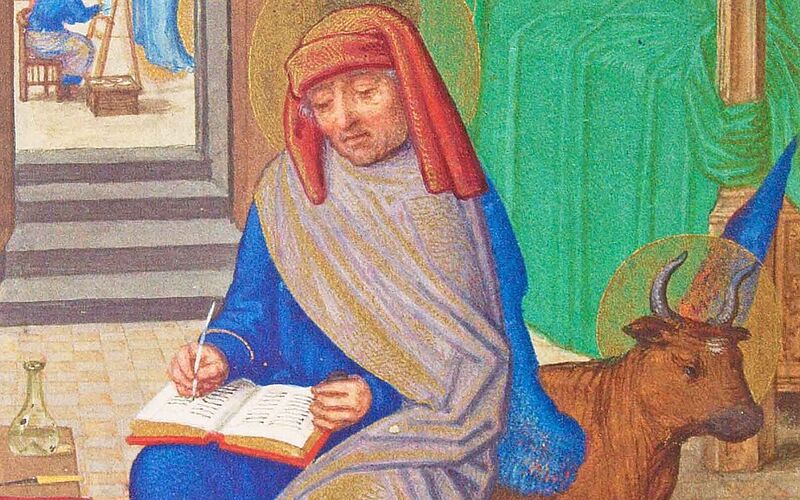Divine Comedy - Strozzi 152 Manuscript
(3,000€ - 7,000€)
The Divine Comedy by Dante Alighieri is arguably the most important literary work of the Middle Ages and a cornerstone of Italian literature. Dante’s spiritual and philosophical journey through the afterlife is invaluable for its representation of the medieval worldview. This splendid manuscript was made within decades of the now-lost original and features 49 bas-de-page miniatures that are artfully colored and present the narrative in a clear and detailed manner as well as gorgeous historiated initial pages by Pacino di Buonaguida. Furthermore, three commentaries by Dante’s contemporaries and son Jacopo give further insight into the text. After being a prized possession of the Strozzi family for generations, this fine Dante manuscript was donated to Florence’s Biblioteca Medicea Laurenziana in 1785.
Divine Comedy - Strozzi 152 Manuscript
Dante Alighieri (ca. 1265-1321) is considered to be the father of the Italian language and his Divina Commedia is not only considered to be the preeminent work of Italian literature but also the most important poem of the Middle Ages. The work has since influenced countless of other authors and is one of the most referenced pieces of literature in the Western literary tradition. Guided by the Roman poet Virgil (70-19 BC), the author and protagonist of the Divine Comedy passes through Hell, Purgatory, and Paradise on a spiritual and philosophical journey that has had a lasting impact not only on Italian literature but on wider European society. Although the original manuscript has not survived, numerous copies were made including this splendid specimen, which is stored under the shelf mark Strozzi 152 in Florence’s Biblioteca Medicea Laurenziana.
Illuminating Dante’s Journey
The manuscript was originally designed to have each of the 100 cantos illustrated, but only 49 artful bas-de-page miniatures were completed, the second section features pen and ink drawings by Maestro Daddesco, while the final section is unfurnished, and it is not known why work on the manuscript finally stopped. These miniatures present a clear narrative, are artful, detailed, and were created with a sophisticated color palette including gold leaf for the wings of angels and the robes of blessed figures. Nonetheless, the manuscript is beautifully illuminated including three gorgeous historiated initials and friezes at the beginning of each cantica from the hand of Pacino di Buonaguida (active ca. 1303 – ca. 1347) as well as various arabesques and volutes. It is one of numerous Dante manuscript produced in the master’s workshop between 1330 and 1350.
Commentaries by Great Minds
Commentaries on the text of the Divine Comedy can also be found in the manuscript. Jacopo della Lana (1290-1365) was from the oldest noble family in Florence and wrote the first commentary on Dante’s work between 1324 and 1328, the preface of which is included here. Bosone da Gubbio was a politician, writer, and friend of Dante’s who wrote a chapter of commentary for the work. Finally, the son of the author, Jacopo Alighieri (1289–1348), wrote an exhaustive commentary on the Inferno examining virtually every line.
Treasure of the Strozzi Library
A coat of arms on the first page suggests that it was made for or owned by a member of the Bugliaffi family but little else is known about the history of the manuscript. At an unknown time it came into the possession of the Strozzi family, who were the wealthiest members of the Florentine nobility and rivals to the Medici family before their exile from Florence in 1434. Senator Carlo Strozzi (1587–1671) was a major bibliophile and author who accumulated a large personal library, which included the codex at hand. It was among 183 codices that were donated to the Laurentian Library in 1785, where it remains today.
Codicology
- Alternative Titles
- Dante Alighieri - Göttliche Kommödie Strozzi 152
La Divina Commedia Laurenziana
Dante Alighieri - Divina Commedia Strozzi 152 - Size / Format
- 184 pages / 37.0 × 24.5 cm
- Origin
- Italy
- Date
- Second quarter of the 14th century
- Epochs
- Style
- Genre
- Language
- Script
- Littera bastarda
- Illustrations
- 49 colored miniatures ; Some drawings ; Numerous historiated initials
- Content
- The Divine Commedy by Dante Alighieri
- Previous Owners
- Carlo di Tommaso Strozzi
Divine Comedy - Strozzi 152 Manuscript
The Angel Boatman
In order to reach the Mountain of Purgatory across the seas, Christian souls gather near Ostia, the Rome’s seaport at the mouth of the Tiber, where they embark on a ship piloted by an Angel Boatman. From there, they are taken West through the Pillars of Hercules and arrive at their destination while singing In exitu Israel de Aegypto. The Angel Boatman’s ship has neither sails nor oars. Dante, kneeling in blue, pleads with the shimmering golden figure, who points to the mortals on the shore.
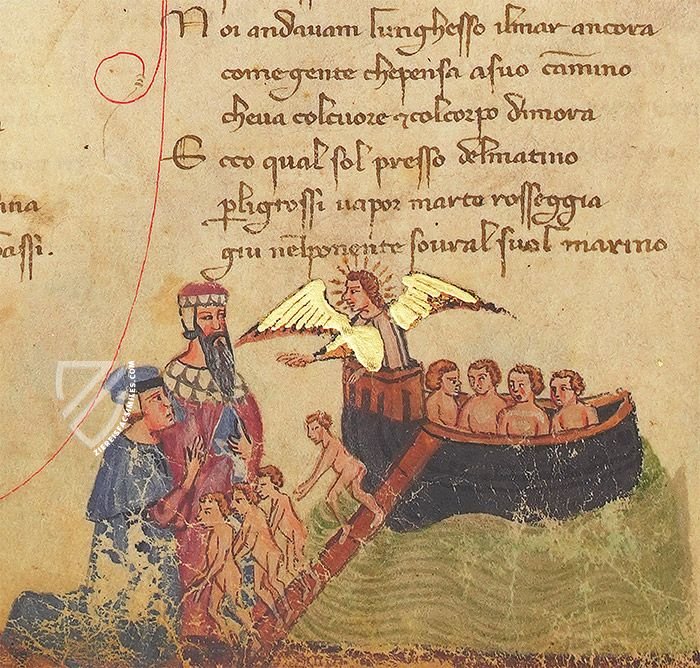
Divine Comedy - Strozzi 152 Manuscript
The Gate of Purgatory Proper
After making their way through Ante-Purgatory, where they meet the souls of the Excommunicate and the Late-Repentant, Dante and Virgil stop to rest as night approaches. Dante falls asleep at 8:30 PM, dreams just before the dawn on Easter Monday, and awakes to find that the has been carried up to the gate of Purgatory Proper.
The bas-de-page shows Dante being carried by an eagle flanked by two flames, and then appears next to Virgil. Both figures kneel before the angel guarding the gate of Purgatory, Peter’s gate. They are allowed to pass through after the angel uses the tip of his sword to draw the letter “P” 7 times saying that the one of the “P”s will be erased by each of the angels granting passage to the 7 terraces of Purgatory.
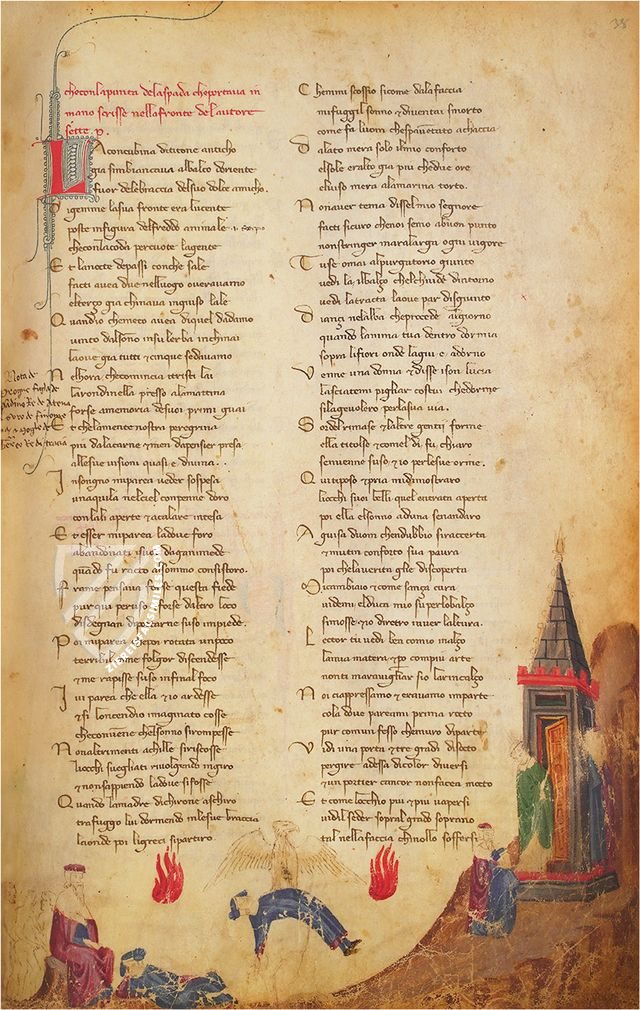
#1 Divina Commedia Strozzi 152
Language: Italian
(3,000€ - 7,000€)
- Treatises / Secular Books
- Apocalypses / Beatus
- Astronomy / Astrology
- Bestiaries
- Bibles / Gospels
- Chronicles / History / Law
- Geography / Maps
- Saints' Lives
- Islam / Oriental
- Judaism / Hebrew
- Single Leaf Collections
- Leonardo da Vinci
- Literature / Poetry
- Liturgical Manuscripts
- Medicine / Botany / Alchemy
- Music
- Mythology / Prophecies
- Psalters
- Other Religious Books
- Games / Hunting
- Private Devotion Books
- Other Genres
- Afghanistan
- Armenia
- Austria
- Belgium
- Colombia
- Croatia
- Cyprus
- Czech Republic
- Denmark
- Egypt
- Ethiopia
- France
- Germany
- Greece
- Hungary
- India
- Iran
- Iraq
- Israel
- Italy
- Japan
- Lebanon
- Luxembourg
- Mexico
- Morocco
- Netherlands
- Palestine
- Peru
- Poland
- Portugal
- Russia
- Serbia
- Spain
- Sri Lanka
- Sweden
- Switzerland
- Syria
- Turkey
- Ukraine
- United Kingdom
- United States
- Uzbekistan
- Aboca Museum
- Ajuntament de Valencia
- Akademie Verlag
- Akademische Druck- u. Verlagsanstalt (ADEVA)
- Aldo Ausilio Editore - Bottega d’Erasmo
- Alecto Historical Editions
- Alkuin Verlag
- Almqvist & Wiksell
- Amilcare Pizzi
- Andreas & Andreas Verlagsbuchhandlung
- Archa 90
- Archiv Verlag
- Archivi Edizioni
- Arnold Verlag
- ARS
- Ars Magna
- ArtCodex
- AyN Ediciones
- Azimuth Editions
- Badenia Verlag
- Bärenreiter-Verlag
- Belser Verlag
- Belser Verlag / WK Wertkontor
- Benziger Verlag
- Bernardinum Wydawnictwo
- BiblioGemma
- Biblioteca Apostolica Vaticana (Vaticanstadt, Vaticanstadt)
- Bibliotheca Palatina Faksimile Verlag
- Bibliotheca Rara
- Boydell & Brewer
- Bramante Edizioni
- Bredius Genootschap
- Brepols Publishers
- British Library
- C. Weckesser
- Caixa Catalunya
- Canesi
- CAPSA, Ars Scriptoria
- Caratzas Brothers, Publishers
- Carus Verlag
- Casamassima Libri
- Chavane Verlag
- Christian Brandstätter Verlag
- Circulo Cientifico
- Club Bibliófilo Versol
- Club du Livre
- CM Editores
- Collegium Graphicum
- Collezione Apocrifa Da Vinci
- Comissão Nacional para as Comemorações dos Descobrimentos Portugueses
- Coron Verlag
- Corvina
- CTHS
- D. S. Brewer
- Damon
- De Agostini/UTET
- De Nederlandsche Boekhandel
- De Schutter
- Deuschle & Stemmle
- Deutscher Verlag für Kunstwissenschaft
- DIAMM
- Droz
- E. Schreiber Graphische Kunstanstalten
- Ediciones Boreal
- Ediciones Grial
- Ediclube
- Edições Inapa
- Edilan
- Editalia
- Edition Deuschle
- Edition Georg Popp
- Edition Leipzig
- Edition Libri Illustri
- Editiones Reales Sitios S. L.
- Éditions de l'Oiseau Lyre
- Editions Medicina Rara
- Editorial Casariego
- Editorial Mintzoa
- Editrice Antenore
- Editrice Velar
- Edizioni Edison
- Egeria, S.L.
- Eikon Editores
- Electa
- Emery Walker Limited
- Enciclopèdia Catalana
- Eos-Verlag
- Ephesus Publishing
- Ernst Battenberg
- Eugrammia Press
- Extraordinary Editions
- Fackelverlag
- Facsimila Art & Edition
- Facsimile Editions Ltd.
- Facsimilia Art & Edition Ebert KG
- Faksimile Verlag
- Feuermann Verlag
- Folger Shakespeare Library
- Franco Cosimo Panini Editore
- Friedrich Wittig Verlag
- Fundación Hullera Vasco-Leonesa
- G. Braziller
- Gabriele Mazzotta Editore
- Gebr. Mann Verlag
- Gesellschaft für graphische Industrie
- Getty Research Institute
- Giovanni Domenico de Rossi
- Giunti Editore
- Graffiti
- Grafica European Center of Fine Arts
- Guido Pressler
- Guillermo Blazquez
- Gustav Kiepenheuer
- H. N. Abrams
- Harrassowitz
- Helikon
- Hendrickson Publishers
- Henning Oppermann
- Herder Verlag
- Hes & De Graaf Publishers
- Hoepli
- Holbein-Verlag
- Hortus Deliciarum
- Houghton Library
- Hugo Schmidt Verlag
- Idion Verlag
- Il Bulino, edizioni d'arte
- ILte
- Imago
- Insel Verlag
- Instituto Nacional de Antropología e Historia
- Istituto dell'Enciclopedia Italiana - Treccani
- Istituto Ellenico di Studi Bizantini e Postbizantini
- Istituto Geografico De Agostini
- Istituto Poligrafico e Zecca dello Stato
- Italarte Art Establishments
- J. Thorbecke
- Jan Thorbecke Verlag
- Johnson Reprint Corporation
- Josef Stocker
- Josef Stocker-Schmid
- Jugoslavija
- Karl W. Hiersemann
- Kasper Straube
- Kaydeda Ediciones
- Kindler Verlag / Coron Verlag
- Kodansha International Ltd.
- Konrad Kölbl Verlag
- Kurt Wolff Verlag
- La Liberia dello Stato
- La Linea Editrice
- La Meta Editore
- Lambert Schneider
- Landeskreditbank Baden-Württemberg
- Leo S. Olschki
- Les Incunables
- Library of Congress
- Libreria Musicale Italiana
- Lichtdruck
- Lito Immagine Editore
- Lumen Artis
- Lund Humphries
- M. Moleiro Editor
- Maison des Sciences de l'homme et de la société de Poitiers
- Manuscriptum
- Martinus Nijhoff
- Maruzen-Yushodo Co. Ltd.
- MASA
- McGraw-Hill
- Militos
- Millennium Liber
- Müller & Schindler
- Nahar and Steimatzky
- National Library of Wales
- Neri Pozza
- Nova Charta
- Oceanum Verlag
- Odeon
- Orbis Mediaevalis
- Orbis Pictus
- Österreichische Staatsdruckerei
- Oxford University Press
- Pageant Books
- Parzellers Buchverlag
- Patrimonio Ediciones
- Pattloch Verlag
- PIAF
- Pieper Verlag
- Plon-Nourrit et cie
- Prestel Verlag
- Princeton University Press
- Prisma Verlag
- Priuli & Verlucca, editori
- Pro Sport Verlag
- Propyläen Verlag
- Pytheas Books
- Quaternio Verlag Luzern
- Reales Sitios
- Recht-Verlag
- Reichert Verlag
- Reichsdruckerei
- Riehn & Reusch
- Roberto Vattori Editore
- Rosenkilde and Bagger
- Roxburghe Club
- Salerno Editrice
- Sarajevo Svjetlost
- Schöck ArtPrint Kft.
- Scolar Press
- Scrinium
- Scripta Maneant
- Scriptorium
- Siloé, arte y bibliofilia
- SISMEL - Edizioni del Galluzzo
- Sociedad Mexicana de Antropología
- Société des Bibliophiles & Iconophiles de Belgique
- Soncin Publishing
- Sorli Ediciones
- Stainer and Bell
- Studer
- Styria Verlag
- Sumptibus Pragopress
- Szegedi Tudomànyegyetem
- Taberna Libraria
- Tarshish Books
- Taschen
- Tempus Libri
- Testimonio Compañía Editorial
- Thames and Hudson
- The Clear Vue Publishing Partnership Limited
- The Facsimile Codex
- The Folio Society
- The Marquess of Normanby
- The Richard III and Yorkist History Trust
- Tip.Le.Co
- TouchArt
- TREC Publishing House
- TRI Publishing Co.
- Trident Editore
- Typis Regiae Officinae Polygraphicae
- Union Verlag Berlin
- Universidad de Granada
- University of California Press
- University of Chicago Press
- Urs Graf
- Vallecchi
- Van Wijnen
- VCH, Acta Humaniora
- VDI Verlag
- VEB Deutscher Verlag für Musik
- Verlag Anton Pustet / Andreas Verlag
- Verlag Bibliophile Drucke Josef Stocker
- Verlag der Münchner Drucke
- Verlag für Regionalgeschichte
- Verlag Styria
- Vicent Garcia Editores
- W. Turnowsky
- Waanders Printers
- Wiener Mechitharisten-Congregation (Wien, Österreich)
- Wissenschaftliche Buchgesellschaft
- Wydawnictwo Dolnoslaskie
- Xuntanza Editorial
- Zakład Narodowy
- Zollikofer AG

